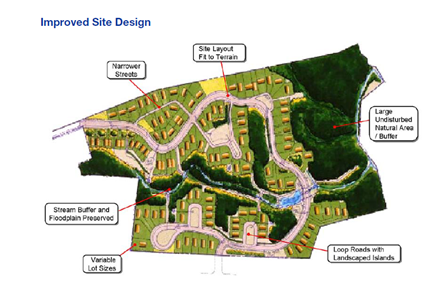Natural Site Design Preservation and Protection
Credit: 8 PDH Hours
Course Fee: $120.00
58 pages
How it Work!
- Register first and log into your account. Study and take the quiz for FREE until passed.
- After passing the quiz, follow the page, pay for the course and print your certificate.
Course Summary
A site plan is a graphical depiction showing the layout of a project. Site plans typically include the location, design, and specifications for roads, streets and parking areas; storm water management systems, wastewater management systems, utilities, and other infrastructure; structures; landscaping and common areas; and other facilities associated with the project.

Development of the site plan should take into consideration all of the information collected during the site assessment and data collection process. When making planning, design, and layout decisions, it is extremely important to take advantage of the strengths and overcome the limitations of project site features identified in the assessment process. Adapting a plan design to existing site conditions and the natural features of the landscape can greatly reduce the project’s environmental impacts.
Storm water management, including erosion and sediment control and post-construction pollution prevention measures, needs to be an integral part of the site planning process and not just an afterthought. Again, it is extremely important to take into consideration details for land clearing, grading, and cut and fill operations that will be used during the construction process when developing the site plan. Therefore, the best approach to developing a set of comprehensive construction plans is to prepare the site plan and storm water pollution prevention plan simultaneously.
Learning Objectives
By the end of this course, the participant should understand how to adapting a plan design to existing site conditions and the natural features of the landscape to greatly reduce the project’s environmental impacts.
Review the quiz before studying the course.
Course Author
Franco F. Davati, P.E.
Certificate of completion of the course
This course comes with a multiple-choice quiz. You can view the quiz and take the quiz if you are logged in your account. You can take the quiz for this online PDH course as many times until passed. The passing grade is 70% and above. After you pass the quiz simply follow the page, to pay for the course and print your certificate instantly. A copy of the certificate and receipt for this course will always be in your account.
This online PDH course can also be used as a continuing education course for the following.
